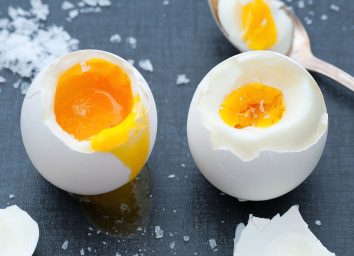This Is How Many Eggs You Should Eat A Day, According To A Dietitian

First thing's first: When we say how many eggs a day you should eat, we don't mean egg whites, we mean the whole thing. We know you may have heard cholesterol rumors that scared you away from those yellow insides. While we won't deny that there is cholesterol in there, research shows that dietary cholesterol has little effect on your blood cholesterol levels.
"Eggs have a history of being marketed poorly. Many people still think that eggs can raise their cholesterol levels, but that's actually not true. Dietary cholesterol actually improves your cholesterol profile," Keri Glassman, MS, RD, CDN, founder of Nutritious Life told us.
Many dietitians, like Glassman, continue to emphasize the wealth of health benefits that eggs can provide. Egg yolks are full of healthy fatty acids and micronutrients like B-vitamins and immune-boosting selenium. Eggs are one of the best bioavailable sources of low-cost protein and metabolism-boosting choline.
But just because eggs have health benefits doesn't mean you should eat them willy nilly. There is actually a limit to how many eggs you should eat on a regular basis to reap the best benefits. This popular protein made it onto our list of 37 Best Breakfast Foods For Optimal Weight Loss for a reason, so we talked to Jim White, RD, ACSM, and owner of Jim White Fitness Nutrition Studios to find out just how many eggs you should eat in a day.
How Many Eggs a Day You Should Eat
Yolk benefits aside, the American Heart Association still advises against consuming more than 300 milligrams of dietary cholesterol a day. Additionally, the USDA's Dietary Guidelines urge Americans to "eat as little dietary cholesterol as possible" to reduce heart disease risk. Since eggs have about 185 milligrams each, White recommends capping your daily egg intake at 1.5 as long as you choose low-cholesterol foods for the rest of your meals.
Studies support this recommendation. A study published in JAMA found that eating high levels of dietary cholesterol—and eggs specifically—may raise the risk for heart disease and death. That means that it's definitely worth keeping an eye on your egg intake.
That 1.5 eggs per day number does change when egg whites come into play on their own. Ditching the yolk means ditching dietary cholesterol and calories, which means you can consume more whites to maintain the same level of protein as you would with a full egg.
There are roughly 3 grams of protein in a single egg white — half that of the whole egg — so it's important to stick to 8 egg whites or less per day.
How To Get it Done
Adding eggs to your diet is a piece of cake. Keep some hard-boiled ones in your fridge for a quick and easy snack after the gym (related: The All-Time Best Way to Cook Hard-Boiled Eggs), or figure out a way to add them to your meals.
Top your avocado toast with an egg for breakfast, or pair eggs with any of these 10 Best Healthy Carbs You Should Have for Breakfast.
For more healthy eating news, make sure to sign up for our newsletter!








